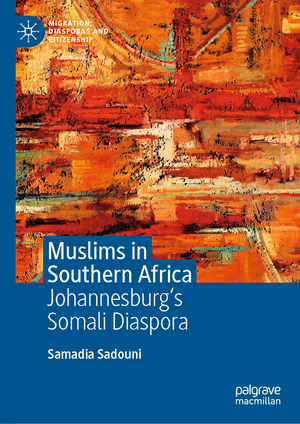Muslims in Southern Africa: Johannesburg’s Somali Diaspora: Migration, Diasporas and Citizenship
Autor Samadia Sadounien Limba Engleză Hardback – 21 mar 2019
Din seria Migration, Diasporas and Citizenship
-
 Preț: 390.63 lei
Preț: 390.63 lei -
 Preț: 397.59 lei
Preț: 397.59 lei - 15%
 Preț: 584.58 lei
Preț: 584.58 lei -
 Preț: 417.90 lei
Preț: 417.90 lei -
 Preț: 390.63 lei
Preț: 390.63 lei -
 Preț: 388.72 lei
Preț: 388.72 lei - 18%
 Preț: 786.84 lei
Preț: 786.84 lei -
 Preț: 419.81 lei
Preț: 419.81 lei -
 Preț: 392.60 lei
Preț: 392.60 lei - 15%
 Preț: 593.08 lei
Preț: 593.08 lei -
 Preț: 386.81 lei
Preț: 386.81 lei -
 Preț: 381.21 lei
Preț: 381.21 lei -
 Preț: 391.61 lei
Preț: 391.61 lei - 15%
 Preț: 640.88 lei
Preț: 640.88 lei - 15%
 Preț: 585.40 lei
Preț: 585.40 lei - 18%
 Preț: 784.79 lei
Preț: 784.79 lei - 15%
 Preț: 641.38 lei
Preț: 641.38 lei - 18%
 Preț: 726.37 lei
Preț: 726.37 lei -
 Preț: 488.51 lei
Preț: 488.51 lei -
 Preț: 270.19 lei
Preț: 270.19 lei -
 Preț: 381.21 lei
Preț: 381.21 lei -
 Preț: 394.51 lei
Preț: 394.51 lei -
 Preț: 387.38 lei
Preț: 387.38 lei -
 Preț: 388.72 lei
Preț: 388.72 lei -
 Preț: 391.61 lei
Preț: 391.61 lei - 18%
 Preț: 789.35 lei
Preț: 789.35 lei -
 Preț: 391.02 lei
Preț: 391.02 lei -
 Preț: 389.31 lei
Preț: 389.31 lei - 15%
 Preț: 502.04 lei
Preț: 502.04 lei - 15%
 Preț: 700.42 lei
Preț: 700.42 lei - 15%
 Preț: 699.77 lei
Preț: 699.77 lei -
 Preț: 389.70 lei
Preț: 389.70 lei - 15%
 Preț: 640.37 lei
Preț: 640.37 lei - 15%
 Preț: 644.18 lei
Preț: 644.18 lei -
 Preț: 381.00 lei
Preț: 381.00 lei - 15%
 Preț: 643.99 lei
Preț: 643.99 lei - 18%
 Preț: 891.48 lei
Preț: 891.48 lei -
 Preț: 395.47 lei
Preț: 395.47 lei - 15%
 Preț: 646.11 lei
Preț: 646.11 lei -
 Preț: 387.75 lei
Preț: 387.75 lei
Preț: 487.96 lei
Nou
Puncte Express: 732
Preț estimativ în valută:
93.39€ • 97.24$ • 78.92£
93.39€ • 97.24$ • 78.92£
Carte tipărită la comandă
Livrare economică 10-24 martie
Preluare comenzi: 021 569.72.76
Specificații
ISBN-13: 9781137467072
ISBN-10: 113746707X
Pagini: 190
Ilustrații: XI, 214 p. 1 illus.
Dimensiuni: 148 x 210 x 22 mm
Greutate: 0.42 kg
Ediția:1st ed. 2019
Editura: Palgrave Macmillan UK
Colecția Palgrave Macmillan
Seria Migration, Diasporas and Citizenship
Locul publicării:London, United Kingdom
ISBN-10: 113746707X
Pagini: 190
Ilustrații: XI, 214 p. 1 illus.
Dimensiuni: 148 x 210 x 22 mm
Greutate: 0.42 kg
Ediția:1st ed. 2019
Editura: Palgrave Macmillan UK
Colecția Palgrave Macmillan
Seria Migration, Diasporas and Citizenship
Locul publicării:London, United Kingdom
Cuprins
Chapter 1: Introduction.- Chapter 2: The Context of Indian Ocean Spatiality.- Chapter 3: Muslim cosmopolitanism in question.- Chapter 4: Racialisation from below: Race and Place-Making in the new South Africa.- Chapter 5: Religious community governance in solidarity.- Chapter 6: Tabligh Jama’at and urban religious order.- Chapter 7: From the “right to the city” to the right to the nation.
Notă biografică
Samadia Sadouni is Associate Professor in Political Science at the University of Lyon, Sciences Po Lyon, and Researcher at Triangle UMR 5206, France.
Textul de pe ultima copertă
This book presents a socio-historical analysis of the Somali Muslim diaspora in Johannesburg and its impact on urban development in the context of Somali migrations in the Southern African Indian Ocean region from the end of the 19th Century to today. The author draws on a combination of archival and ethnographic research to examine the interlocking processes of migration, urban place-making, economic entrepreneurship and transnational mobility through the lens of religious practice and against the background of historical interactions between the Somali diaspora and the British and Ottoman Empires. Comparison with other Muslim diasporas in the region, primarily Indians, adds further depth to an investigation which will shed new light on the Somali experience of mobility and the urban development of South Africa across its colonial, apartheid and democratic periods. The politics of race, imperial and post-imperial identities, and religious community governance are shown to be key influencing factors on the Somali Diaspora in Johannesburg. This sophisticated analysis will provide a valuable resource for students and scholars of urban geography, the sociology of religion, and African, race, ethnic and migration studies.
Samadia Sadouni is Associate Professor in Political Science at the University of Lyon, Sciences Po Lyon, and Researcher at Triangle UMR 5206, France.
Caracteristici
Examines the relationship between urban development and transnational experiences of religion Sheds new light on the Somali experience of mobility and place-making Reveals the historical impact and cultural legacy of British and Ottoman imperialism on the Somali diaspora Examines urban identity construction and social change in the Somali community in terms of gender, religion and social class Offers a comparative perspective on Muslim diasporas that reveals their influence on how the role of religion is understood in secular post-apartheid South Africa
